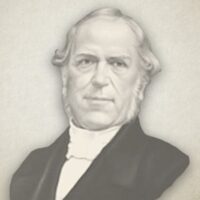
36 General Comment On Universal Sounding Texts
To me it appears the plain truth of God, and mind of the Spirit, that the alls and universal sounds, in texts relating to the redemption work of Christ, are of the very same meaning and intent as those in the texts relating to all flesh seeing the salvation glory of the Lord – of the Spirit’s pouring out upon all flesh – of all nations and tongues being gathered to see the glory of the Lord – of all men being drawn unto Christ – and of the Holy Spirit’s reproving or convincing the world of sin, and of righteousness, and of judgment, John 16:8. And now to attach individual universality to the first class of these alls, &c must be to hold a perishable redemption, with the wreck of all involved in it, to an extent as far as the whole world is not saved. And to attach individual universality to the second class of these alls, must be at once to give God the lie, and say that his truth does not `endure for ever,’ nor his `word for ever settled in heaven.’ In my opinion, however, it is a decided error to consider that either of these classes of alls are at all intended to express personal numbers, few or many, in the redemption and salvation work of the Lord; but to declare the extension of the redemption and salvation work and goodness of the Lord to all nations every where, as in truth has been, is, and shall be done; and which meaning they sing with so much joy before the throne, as though nothing indeed is lost that God ever meant to save, and as through redemption itself is certain salvation; saying, ‘Thou wast slain, and hast redeemed us to God by thy blood, out of every kindred, and tongue, and people, and nation,’ Rev 5. `These were redeemed from among men,’ Rev 14:4. If all men alike individually and universally, were redeemed, it would not be common sense to say, that with the same redemption some were redeemed out of and from amongst the rest.
The personal numbers of the redeemed, as comprehended in the mind and will of God, are set forth in the sacred word as well known, but that is in a different form of expression to the above two classes of ails, as in the following manner, `By the obedience of one, many shall be made righteous,’ Rom 5:19. `The Son of man came not to be ministered unto, but to minister, and to give his life a ransom for many,’ Matt 20:28. `By his knowledge shall my righteous servant justify many; for he shall bear their iniquities,’ Isaiah 53:11. `I beheld, and lo, a great multitude, which no man could number, of all nations, and kindreds, and people, and tongues, stood before the throne, and before the Lamb,’ Rev 7:9; `Having this seal, the Lord knoweth them that are his,’ 2 Tim 2:19. And thus, if a proper distinction be made between reference to all nations alike, and that of the personal numbers redeemed out of all nations, much error, confusion, and contradiction is easily avoided; for that while the Lord’s redeemed and saved church is out of all people, tongues, and nations of the whole world, the whole world of all people, tongues, and nations, are not the Lord’s redeemed and saved, for it is out of, and from among, and so not the universal whole, first redeemed and then lost.
John Foreman (1792-1872) was a Strict and Particular Baptist preacher. He was appointed the Pastor of Hill Street Chapel, Marylebone, serving this position for close to forty years.
JOHN FOREMAN'S LIFE AND MINISTRY
JOHN FOREMAN ON DUTY FAITH (COMPLETE)
JOHN FOREMAN'S BAPTISM AND COMMUNION CONSIDERED (COMPLETE)




